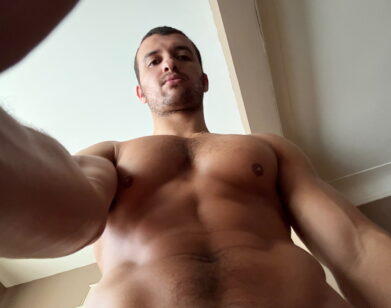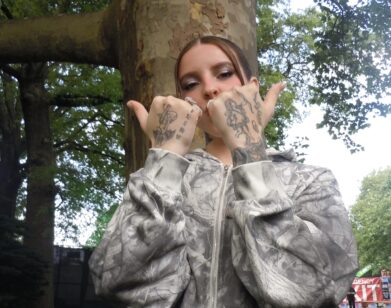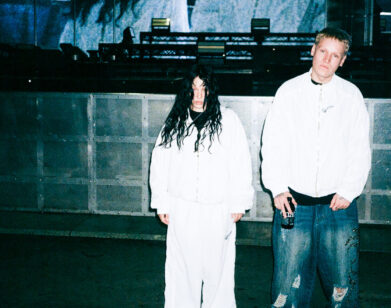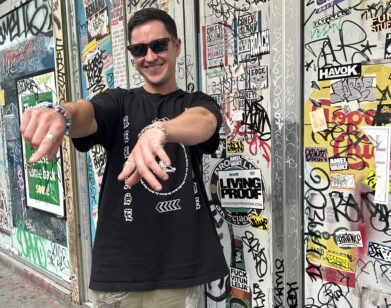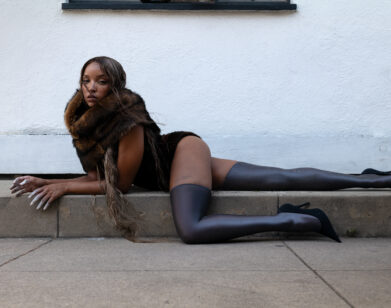“It’s Not This Utopian Thing Anymore”: Justin Strauss On The End of Output And A Type of Clubbing As We Never Knew It
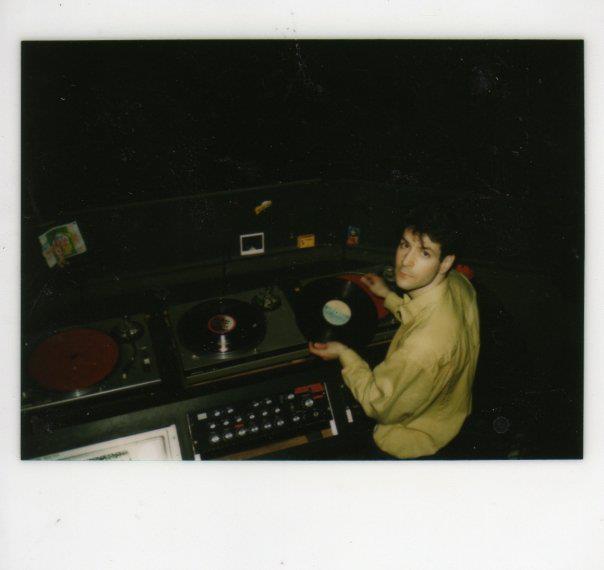
A polaroid of Strauss DJing at The Ritz in 1981.
Last week, Williamsburg’s least inimitable, and most infamous club, Output shuttered its doors permanently this New Year’s eve after a 5-year run. A mecca for DJs and dancers, alike, the space represented the best and worst ends of New York City’s nightlife spectrum. To give us a sense of the loss, and what it portends for dance culture in the city, we spoke with Justin Strauss, the city’s own resident DJ and pioneering musician. Strauss has played, in his own words, every notable dance club in the city’s history, from the Mudd Club to Area to Output. Over the phone, he addressed the club’s complicated presence in Brooklyn nightlife and the shift in club culture it helped to set off. The following has been lightly edited and hyperlinked for your reading pleasure.
———
Back in 2013, Shawn Schwartz from the Halcyon Record store in Brooklyn was telling me about this new club that he was doing with Nicholas [Matar] from Cielo. He said I should come check it out. So, I went while it was still being built and was blown away. There was not really anything like that in Williamsburg at the time. There had a few clubs like Volume and Studio B, which we’re groundbreaking in terms of doing things in Williamsburg, but that were a bit too early for their time.
Obviously, Output was designed around the sound system, which to me was really the most exciting thing about it because at that point clubs were not really caring about sound again. They were just focusing on a lot of exterior and design stuff and not giving much thought to what clubs should sound like. It was a disturbing trend and then Output came along. It was an incredible sound system. I was like, “Wow, I hope I get to play in here.” The DJ booth was designed for a DJ, it was a dream. It was a dream machine. I played the opening weekend with Mike Simonetti and Justin Miller. A lot of great parties, a lot of great nights.
The bookings were really top notch. They would bring in great people. You know it was a really good spot. The owners were DJs. They cared. They treated their DJs with respect and professionalism that sometimes doesn’t come along with clubs.
I’ve been doing this for a long time. My first gig was at the Mudd Club. I’ve played at every club that had residencies — every great club in New York. And, they’re all gone. That’s the nature of club life and the nature of New York is nothing lasts forever, except maybe the Pyramid Club. It’s an ever-changing thing, and it’s really sad when something like Output, or Cielo, or both of them at once, are not going to be here anymore.
Did I go there every night to either one of them? No. Things have changed. Where things are now in dance music in Brooklyn, Williamsburg and even Meatpacking [District] are very different. They had to do what they had to do to survive, and I understand that. I couldn’t even imagine what a club is up against, I have no idea. I just come in there and play records and try to make people have a good time.
One of the saddest parts is that a lot of people are out of work right now. From bartenders to busboys to sound people to lighting people to bookers — a lot of people depended on these venues for their income. People don’t think about that.
Output set a benchmark. They made other clubs be more competitive in terms of sound and just care more, in general. Big acts would rather go to Output because the sound is better. Now, clubs are paying a lot more attention to that. Sure, people bitched about no phones, but as a DJ it’s really nice to see people not doing that on the dance floor and engaging with each other, especially at parties. The DJ thing has become a bit of a performance to some of these people who may not have grown up in a clubbing environment. It’s like, “Oh, let’s go see a DJ and stand there.” When I played, by myself, or with Horse Meat Disco, people just danced and had fun. They looked at each other. They didn’t just stand there watching a DJ play.
The club came along just at a time when dance music was becoming a mainstream commodity. Dance music was not what it is today. It was a different scene. You can’t even compare it. Things are always changing in New York, it is what it is. You either adapt to that or you die. So, it’s not the same, and it never will be the same. The world’s not the same.
Output tried really hard to do something with integrity and quality. It wasn’t perfect, but what is. It unfortunately became this emblem of this “bro culture” in New York, in Williamsburg, in a lot of places — and that culture really annoys me to no end. I’m sure people have had some horrible experiences there. I’ve heard of things happening, but they’ve also happened at a lot of places. And there’s only so much a club can control, as well. Output also had bills to pay.They were a relatively huge operation. Nobody wants to talk about it, but you have DJ charging an insane amount of money for a performance. In some instances, as much as $50,000 for a big name. Who’s going to pay for that? You have to balance this with letting people in to make the money. The cool people don’t always, and never did, want to pay to get into a club. They never want to pay for a drink.
We all know what’s going on right now. Dance music is very popular. And as it becomes more popular, it becomes watered down. Hopefully, maybe some new things will come out of it. More underground scenes can emerge again, as they are with Greenpoint’s The Lot Radio. Maybe there will be smaller parties or maybe some new super-club will open. I don’t know. I can’t imagine it being any good.
The people who know what it takes to do something like this, who have been around for a while, realize what they’re up against. They understand that it’s just not going to be this utopian thing anymore. I worked at my favorite club, other than the Paradise Garage, which was Area. They changed the theme of the club every six weeks. Something like that just doesn’t seem possible anymore. It was a different time. Things were different. You would go to a club, and it wouldn’t even matter who was DJing. You would go because you knew the club was going to be great. You trusted the club because you knew they were going to have great music. Your friends were going to be there, and it would just be fun. It was just a group of like-minded people, who made it about the art first. Nothing lasts forever. It’s easy to complain, truly, but it’s a lot harder to actually go and try and do something and change things.
———
Justin Strauss is a New York City-based musician and DJ.

